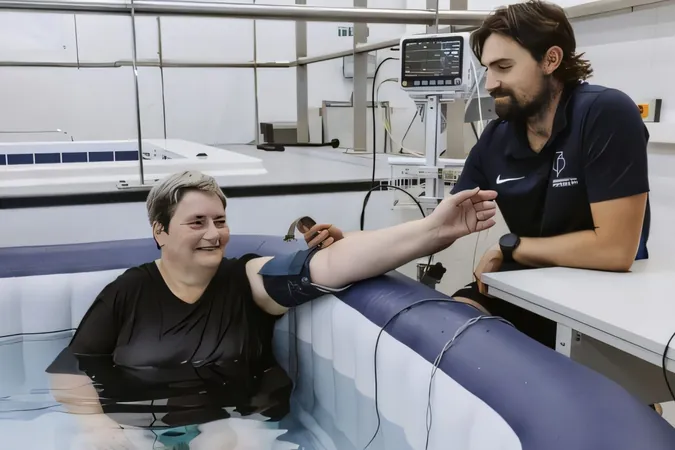
Hot Tub Therapy: A Groundbreaking Hope for Type 2 Diabetes Sufferers!
2024-12-16
Author: Sarah
Introduction
Recent research from the University of Portsmouth has unveiled a fascinating potential for hot tub therapy to revolutionize the management of type 2 diabetes. The study showed that soaking in hot water could significantly enhance insulin effectiveness, improve heart health, and reduce blood pressure among individuals battling this chronic condition.
Study Details
In a controlled setting, 14 participants were immersed in 40°C water for an hour, eight to ten times over a two-week period. The results were so compelling that they were published in two academic journals: the Journal of Thermal Biology and the American Journal of Physiology. This innovative research is the first of its kind to demonstrate notable improvements in insulin sensitivity among participants following repeated hot tub sessions.
Expert Insights
Dr. Ant Shepherd, a lead researcher from the University’s School of Psychology, Sport, and Health Sciences, emphasized the critical need for new treatment methods for diabetes. "People with diabetes struggle with high sugar levels. Our goal is to lower these levels through various means, including innovative therapies like hot water immersion," he stated.
Comparative Effectiveness
While traditional methods like diet, exercise, and medication are effective, they often come with barriers that prevent widespread adherence. The findings from this hot tub therapy study suggest a promising alternative. The research indicated that though glucose levels remained unchanged, insulin levels decreased, indicating that the participants’ bodies were becoming more efficient at using the insulin they produced.
Safety Monitoring
The study meticulously monitored critical parameters like deep body temperature, blood pressure, and heart rate every 15 minutes for participant safety. Researchers aimed for a target internal temperature of 38.5 to 39°C, immersing participants up to their collarbones.
Caloric Efficiency
Dr. Thomas James, the principal author, shared additional insights, noting that participants burned fewer calories during the sessions, implying their bodies were becoming more efficient at rest. He highlighted that this improved efficiency could make everyday activities, such as climbing stairs or playing with children, much easier.
Heart Function Improvement
Moreover, the study found that hot tub immersion not only facilitated better insulin sensitivity but also eased heart function and lowered blood pressure. Dr. James elaborated on this striking relationship, explaining, "When the body is exposed to heat, it adapts by reducing resting energy expenditure. This means the heart doesn’t have to work as hard to supply oxygen throughout the body, ultimately decreasing blood vessel pressure."
Future Implications
With the implications of this study, there’s an exciting avenue for managing type 2 diabetes through heat therapy. Though further research with larger participant groups is necessary to validate these promising results, the idea of using hot tubs as a therapeutic tool for diabetes management could pave the way for new lifestyle interventions that enhance the quality of life for millions.
Conclusion
As the exploration of hot tub therapy continues, both researchers and diabetes sufferers alike remain hopeful for the potential improvements in blood sugar control, overall well-being, and heart health emerging from this groundbreaking study. Keep an eye on this developing story—hot tubs might just become the go-to solution for those seeking relief from the challenges of type 2 diabetes!

 Brasil (PT)
Brasil (PT)
 Canada (EN)
Canada (EN)
 Chile (ES)
Chile (ES)
 España (ES)
España (ES)
 France (FR)
France (FR)
 Hong Kong (EN)
Hong Kong (EN)
 Italia (IT)
Italia (IT)
 日本 (JA)
日本 (JA)
 Magyarország (HU)
Magyarország (HU)
 Norge (NO)
Norge (NO)
 Polska (PL)
Polska (PL)
 Schweiz (DE)
Schweiz (DE)
 Singapore (EN)
Singapore (EN)
 Sverige (SV)
Sverige (SV)
 Suomi (FI)
Suomi (FI)
 Türkiye (TR)
Türkiye (TR)